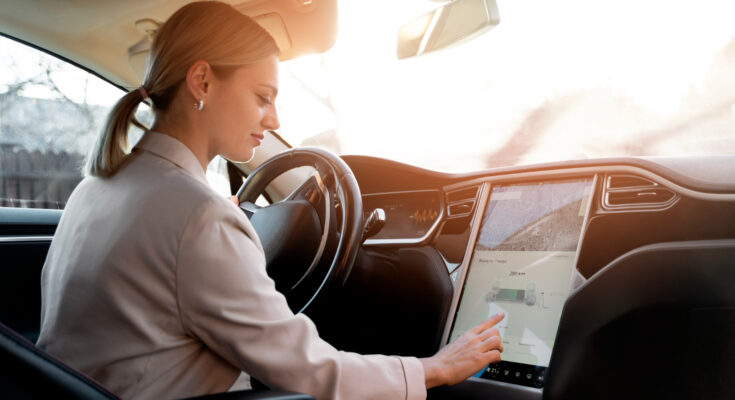The Passenger Car Sensors Global Market Report 2024 by The Business Research Company provides market overview across 60+ geographies in the seven regions – Asia-Pacific, Western Europe, Eastern Europe, North America, South America, the Middle East, and Africa, encompassing 27 major global industries. The report presents a comprehensive analysis over a ten-year historic period (2010-2021) and extends its insights into a ten-year forecast period (2023-2033).
Learn More On The Passenger Car Sensors Market:
https://www.thebusinessresearchcompany.com/report/passenger-car-sensors-global-market-report
According to The Business Research Company’s Passenger Car Sensors Global Market Report 2024, The passenger car sensors market size is expected to see strong growth in the next few years. It will grow to $6.88 billion in 2028 at a compound annual growth rate (CAGR) of 6.2%. The growth in the forecast period can be attributed to development of sensors that contribute to the sustainability, development of high-resolution imaging sensors, sensors that monitor external conditions, implementation of new regulations, and Sensors that provide real-time traffic data. Major trends in the forecast period include artificial intelligence and internet of things are being integrated with sensors, microelectromechanical systems, advancements in electromagnetic sensors, integration of 5G technology, and vehicle-to-everything (V2X) communication technology.
The growing adoption of autonomous passenger cars is expected to propel the growth of the passenger car sensors market going forward. Autonomous passenger cars are vehicles designed for personal use that can navigate and operate without human intervention, using advanced technologies. Autonomous vehicles (AVs) use advanced sensors, cameras, and artificial intelligence to detect and respond to potential hazards, significantly reducing the risk of accidents caused by human error. Passenger car sensors, including LiDAR, radar, cameras, ultrasonic sensors, GPS, IMU, and V2X communication, enable autonomous vehicles to perceive their surroundings, navigate accurately, and make real-time decisions for safe and efficient operation. For Instance, in December 2022, according to the National Association of Insurance Commissioners, a US-based non-profit organization, by 2025, it is expected that there will be 3.5 million self-driving vehicles on U.S. roads, increasing to 4.5 million by 2030. Therefore, the growing adoption of autonomous passenger cars drives the growth of the passenger car sensors market.
Get A Free Sample Of The Report (Includes Graphs And Tables):
https://www.thebusinessresearchcompany.com/sample.aspx?id=17223&type=smp
The passenger car sensors market covered in this report is segmented –
1) By Sensor Type: Pressure Sensors, Position Sensors, Speed Sensors, Temperature Sensors, Oxygen (O2) And Nitrogen Oxide (Nox) Sensors, Safety And Comfort Sensors, Other Sensor Types
2) By Body Control: Weight Reduction, Multiplex Compatibility, Stringent Safety Regulations
3) By Vehicle Type: Passenger Vehicle, Light Commercial Vehicle
4) By Application: Powertrain Or Drivetrain, Exhaust, Interior Or Comfort, Body Control, Driver Assistance System
Major companies operating in the passenger car sensors market are developing nitrogen oxide (NOx) sensors to address increasingly stringent emissions regulations, improve engine efficiency, and enhance overall vehicle performance. NOx sensor are crucial for monitoring and controlling NOx emissions in real-time, ensuring compliance with environmental standards and reducing harmful pollutants. For instance, in December 2023, Delphi Technologies, a UK-based automotive company, launched a range of NOx sensors for the European aftermarket. These sensors measure the amount of NOx in exhaust gases and help vehicles comply with current and future emission regulations. The sensors cover popular passenger car brands such as Mercedes-Benz, Peugeot, Opel, Skoda, BMW, Renault, and Volkswagen and commercial vehicles from brands such as DAF, MAN, and Scania.
The passenger car sensors market report table of contents includes:
1. Executive Summary
2. Market Characteristics
3. Market Trends And Strategies
4. Impact Of COVID-19
5. Market Size And Growth
6. Segmentation
7. Regional And Country Analysis
.
.
.
27. Competitive Landscape And Company Profiles
28. Key Mergers And Acquisitions
29. Future Outlook and Potential Analysis
Contact Us:
The Business Research Company
Europe: +44 207 1930 708
Asia: +91 88972 63534
Americas: +1 315 623 0293
Email: [email protected]
Follow Us On:
LinkedIn: https://in.linkedin.com/company/the-business-research-company
Twitter: https://twitter.com/tbrc_info
Facebook: https://www.facebook.com/TheBusinessResearchCompany
YouTube: https://www.youtube.com/channel/UC24_fI0rV8cR5DxlCpgmyFQ
Blog: https://blog.tbrc.info/
Healthcare Blog: https://healthcareresearchreports.com/
Global Market Model: https://www.thebusinessresearchcompany.com/global-market-model




